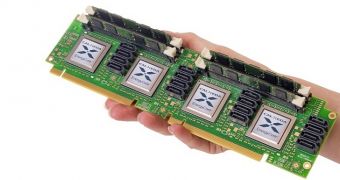Calxeda probably didn't mind becoming the main brand behind ARM server processor modules all those months ago, but now it is backing out of the movement entirely until it manages to restructure itself.
According to company President Barry Evans, Calxeda had a vision of how it should operate, a vision that was made impossible by the “load” of pioneering.
“Carrying the load of industry pioneer has exceeded our ability to continue to operate as we had envisioned,” were his actual words.
Evans didn't say what the restructuring procedure was meant to turn the company into. We do, however, know that client companies with projects based on the EXC-2000 system-on-chip devices will continue to get their orders.
Some parties have speculated that HP and/or Dell will buy Calxeda's intellectual property and use it in their own ARM server chips.
It's doubtful that Calxeda will just allow itself to be assimilated so easily though. After all, it did pretty well as an independent startup.
Back in October 2012, it had 130 people on staff and raised $55 million / €40 million during that month alone, leading to a capital of $90 million / €66 million.
Calxeda also boasted a partnership with HP, for powering the latter's “Project Moonshot” server program. Or at least that was the plan.
HP's moonshot ended up using Intel Atom chips in its first iteration, because Calxeda hadn't made 64-bit capable ARM compute modules, only 32-bit.
Calxeda was going to release 64-bit ARM server processors in 2014, but at this point, it's doubtful that that will happen. At the very least, the roadmap will be pushed back due to the company restructuring happening now.
“As an innovator, Calxeda successfully demonstrated the benefits of efficient ARM-based servers and we are hopeful their restructuring can preserve the technology that they developed. Many other companies are now developing solutions around ARM spanning a range of workloads and goals, so regardless, today's news doesn't change our commitment to, or outlook on the server market,” an ARM spokesperson told PCMag.

 14 DAY TRIAL //
14 DAY TRIAL //